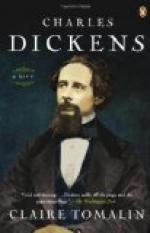of 1837—“Pickwick,” it will
be remembered, going on all the while—he
entered upon the duties of editor of Bentley’s
Miscellany, and in the second number began the
publication of “Oliver Twist,” which was
continued into the early months of 1839, when his
connection with the magazine ceased. In the April
of 1838, and simultaneously, of course, with “Oliver
Twist,” appeared the first part of “Nicholas
Nickleby”—the last part appearing
in the October of the following year. Three novels
of more than full size and of first-rate importance,
in less than four years, besides a good deal of other
miscellaneous work—certainly that was “good
going.” The pace was decidedly fast.
Small wonder that The Quarterly Review, even
so early as October, 1837, was tempted to croak about
“Mr. Dickens” as writing “too often
and too fast, and putting forth in their crude, unfinished,
undigested state, thoughts, feelings, observations,
and plans which it required time and study to mature,”
and to warn him that as he had “risen like a
rocket,” so he was in danger of “coming
down like the stick.” Small wonder, I say,
and yet to us now, how unjust the accusation appears,
and how false the prophecy. Rapidly as those
books were executed, Dickens, like the real artist
that he was, had put into them his best work.
There was no scamping. The critics of the time
judged superficially, not making allowance for the
ample fund of observations he had amassed, for the
genuine fecundity of his genius, and for the admirable
industry of an extremely industrious man. “The
World’s Workers”—there exists
under that general designation a series of short biographies,
for which Miss Dickens has written a sketch of her
father’s life. To no one could the description
more fittingly apply. Throughout his life he worked
desperately hard. He possessed, in a high degree,
the “infinite faculty for taking pains,”
which is so great an adjunct to genius, though it
is not, as the good Sir Joshua Reynolds held, genius
itself. Thus what he had done rapidly was done
well; and, for the rest, the writer, who had yet to
give the world “Martin Chuzzlewit,” “The
Christmas Carol,” “David Copperfield,”
and “Dombey,” was not “coming down
like a stick.” There were many more stars,
and of very brilliant colours, to be showered out
by that rocket; and the stick has not even yet fallen
to the ground.[13]
Naturally, with the success of “Pickwick,” came a great change in Dickens’ pecuniary position. He had, as we have seen, been glad enough, before he began the book, to close with the offer of L14 for each monthly part. That sum was afterwards increased to L15, and the two first payments seem to have been made in advance for the purpose of helping him to defray the expenses of his marriage. But as the sale leapt up, the publishers themselves felt that such a rate of remuneration was altogether insufficient, and sent him, first and last, a goodly number of supplementary cheques, for sums amounting in the aggregate, as they




